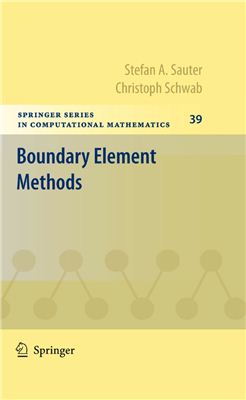Springer, 2010. - 500 pages.
This work presents a thorough treatment of boundary element methods (BEM) for solving strongly elliptic boundary integral equations obtained from boundary reduction of elliptic boundary value problems in R^
3. The book is self-contained, the prerequisites on elliptic partial differential and integral equations being presented in Chapters 2 and 3.
The main focus is on the development, analysis, and implementation of Galerkin boundary element methods, which is one of the most flexible and robust numerical discretization methods for integral equations. For the efficient realization of the Galerkin BEM, it is essential to replace time-consuming steps in the numerical solution process with fast algorithms. In Chapters 5-9 these methods are developed, analyzed, and formulated in an algorithmic way.
This work presents a thorough treatment of boundary element methods (BEM) for solving strongly elliptic boundary integral equations obtained from boundary reduction of elliptic boundary value problems in R^
3. The book is self-contained, the prerequisites on elliptic partial differential and integral equations being presented in Chapters 2 and 3.
The main focus is on the development, analysis, and implementation of Galerkin boundary element methods, which is one of the most flexible and robust numerical discretization methods for integral equations. For the efficient realization of the Galerkin BEM, it is essential to replace time-consuming steps in the numerical solution process with fast algorithms. In Chapters 5-9 these methods are developed, analyzed, and formulated in an algorithmic way.

